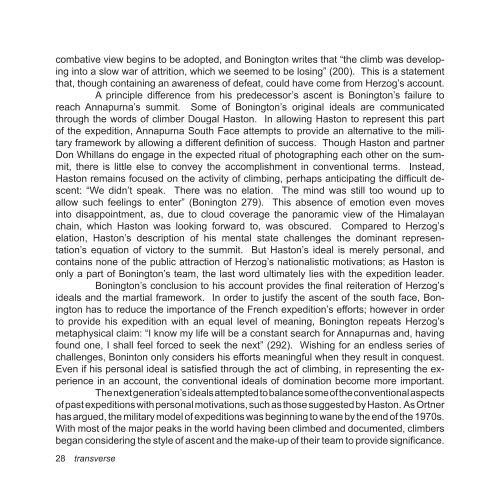Untitled - Centre for Comparative Literature - University of Toronto
Untitled - Centre for Comparative Literature - University of Toronto
Untitled - Centre for Comparative Literature - University of Toronto
You also want an ePaper? Increase the reach of your titles
YUMPU automatically turns print PDFs into web optimized ePapers that Google loves.
combative view begins to be adopted, and Bonington writes that “the climb was developing<br />
into a slow war <strong>of</strong> attrition, which we seemed to be losing” (200). This is a statement<br />
that, though containing an awareness <strong>of</strong> defeat, could have come from Herzog’s account.<br />
A principle difference from his predecessor’s ascent is Bonington’s failure to<br />
reach Annapurna’s summit. Some <strong>of</strong> Bonington’s original ideals are communicated<br />
through the words <strong>of</strong> climber Dougal Haston. In allowing Haston to represent this part<br />
<strong>of</strong> the expedition, Annapurna South Face attempts to provide an alternative to the military<br />
framework by allowing a different defi nition <strong>of</strong> success. Though Haston and partner<br />
Don Whillans do engage in the expected ritual <strong>of</strong> photographing each other on the summit,<br />
there is little else to convey the accomplishment in conventional terms. Instead,<br />
Haston remains focused on the activity <strong>of</strong> climbing, perhaps anticipating the diffi cult descent:<br />
“We didn’t speak. There was no elation. The mind was still too wound up to<br />
allow such feelings to enter” (Bonington 279). This absence <strong>of</strong> emotion even moves<br />
into disappointment, as, due to cloud coverage the panoramic view <strong>of</strong> the Himalayan<br />
chain, which Haston was looking <strong>for</strong>ward to, was obscured. Compared to Herzog’s<br />
elation, Haston’s description <strong>of</strong> his mental state challenges the dominant representation’s<br />
equation <strong>of</strong> victory to the summit. But Haston’s ideal is merely personal, and<br />
contains none <strong>of</strong> the public attraction <strong>of</strong> Herzog’s nationalistic motivations; as Haston is<br />
only a part <strong>of</strong> Bonington’s team, the last word ultimately lies with the expedition leader.<br />
Bonington’s conclusion to his account provides the fi nal reiteration <strong>of</strong> Herzog’s<br />
ideals and the martial framework. In order to justify the ascent <strong>of</strong> the south face, Bonington<br />
has to reduce the importance <strong>of</strong> the French expedition’s ef<strong>for</strong>ts; however in order<br />
to provide his expedition with an equal level <strong>of</strong> meaning, Bonington repeats Herzog’s<br />
metaphysical claim: “I know my life will be a constant search <strong>for</strong> Annapurnas and, having<br />
found one, I shall feel <strong>for</strong>ced to seek the next” (292). Wishing <strong>for</strong> an endless series <strong>of</strong><br />
challenges, Boninton only considers his ef<strong>for</strong>ts meaningful when they result in conquest.<br />
Even if his personal ideal is satisfi ed through the act <strong>of</strong> climbing, in representing the experience<br />
in an account, the conventional ideals <strong>of</strong> domination become more important.<br />
The next generation’s ideals attempted to balance some <strong>of</strong> the conventional aspects<br />
<strong>of</strong> past expeditions with personal motivations, such as those suggested by Haston. As Ortner<br />
has argued, the military model <strong>of</strong> expeditions was beginning to wane by the end <strong>of</strong> the 1970s.<br />
With most <strong>of</strong> the major peaks in the world having been climbed and documented, climbers<br />
began considering the style <strong>of</strong> ascent and the make-up <strong>of</strong> their team to provide signifi cance.<br />
28 transverse




